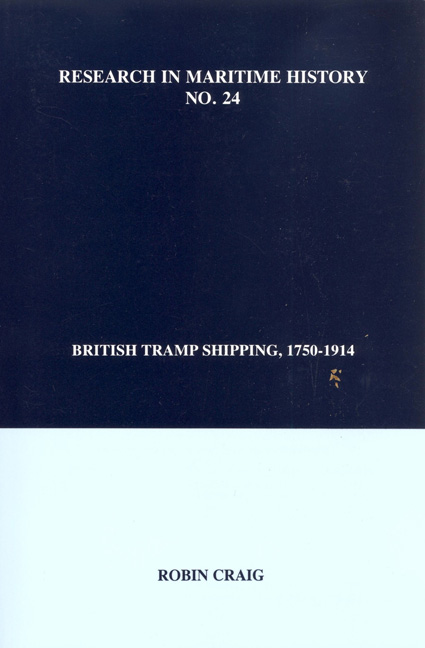Book contents
- Frontmatter
- Contents
- Introduction
- Tramp Shipping and Ownership
- The Trades
- The Seamen
- Tramp-Shipping Regions
- A. Wales
- “Industrial Glamorgan: The Ports and Shipping, c. 1750-1914”
- “Trade and Shipping in South Wales - The Radcliffe Company, 1882-1921”
- “The 1860s at Llanelli - A Dynamic Decade for Trade and Shipping”
- “Carmarthenshire Shipping in the Eighteen Forties”
- “Hetty Ellen of Aberystwyth and Doctor Livingstone”
- B. The Northwest
- C. The West Country
- D. The Northeast
- E. The Southeast
- F. The British Empire: Maritime Canada
- Bibliography
“Trade and Shipping in South Wales - The Radcliffe Company, 1882-1921”
from A. Wales
- Frontmatter
- Contents
- Introduction
- Tramp Shipping and Ownership
- The Trades
- The Seamen
- Tramp-Shipping Regions
- A. Wales
- “Industrial Glamorgan: The Ports and Shipping, c. 1750-1914”
- “Trade and Shipping in South Wales - The Radcliffe Company, 1882-1921”
- “The 1860s at Llanelli - A Dynamic Decade for Trade and Shipping”
- “Carmarthenshire Shipping in the Eighteen Forties”
- “Hetty Ellen of Aberystwyth and Doctor Livingstone”
- B. The Northwest
- C. The West Country
- D. The Northeast
- E. The Southeast
- F. The British Empire: Maritime Canada
- Bibliography
Summary
Although the industralization of south Wales required the deployment of a great quantity of merchant shipping, neither of the two principal ports of registry, Swansea and Cardiff, manifest much evidence, in the classical period of development, of there being a substantial body of local men who were prepared to invest heavily in ships. Of the two ports Swansea took the lead with Cardiff lagging well behind. Despite an increasing volume of trade in coal, iron ore, copper ore and manufactured iron and tin plate, most of this traffic was carried in vessels owned outside the Principality with West Country shipowners taking the lion's share.
It was not until the 1860s and 1870s, with the very rapid growth in the export of steam coal, that Cardiff-based shipowners began to purchase steamships on a considerable and increasing scale. With the advent of the economical, bulk carrying steamship - the characteristics of a tramp steamer - Cardiff shipowners began to play a much more dominant role, with outward coal cargoes combining effectively with homeward freights of iron ore and pit wood. Next, the coal cargoes outwards were complemented by freights of grain from the Black Sea as that trade expanded rapidly in the 1870s, this being one major factor in the collapse of the high farming era in Britain: it was this conjunction of coal and grain which was to nourish the fortune of more than one Cardiff shipowner.
The advent of large-scale shipowning at the Welsh ports required the emergence of a number of new and dynamic entrepreneurs, but this remains a neglected aspect of Welsh economic and social history, as has recently been pointed out by Sir John Habakkuk in his review in Morgannwg(1981, pp. 134- 135) of Volume V of the Glamorgan County History.This weakness in Welsh historiography is in marked contrast to the attention lavished upon other aspects of Welsh history. A glance at the Dictionary of Welsh Biographyis sufficient to confirm this neglect: religious and educational leaders are given great, and no doubt justifiable, prominence, as are leaders of organized labour and politicians. But entrepreneurs are accorded scant attention, despite their undoubted contribution to Welsh industrial and commercial growth.
- Type
- Chapter
- Information
- British Tramp Shipping, 1750–1914 , pp. 187 - 210Publisher: Liverpool University PressPrint publication year: 2003



